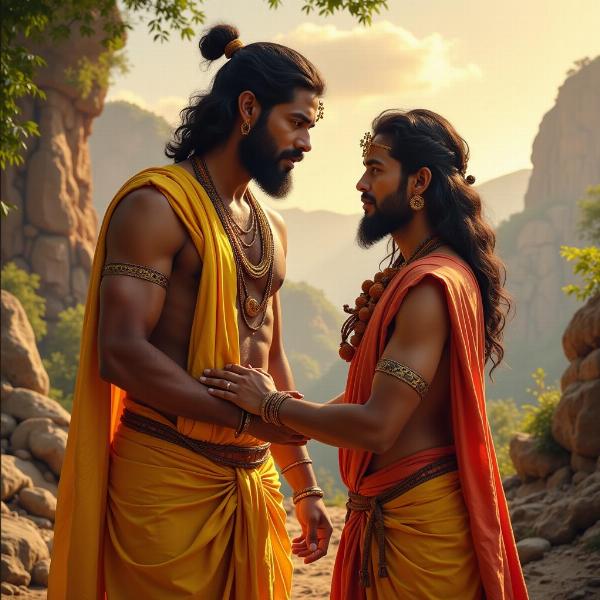Understanding the meaning and cultural significance of the word “agraja” offers valuable insights into the familial relationships within Indian society. “Agraja” in Hindi refers to an elder brother. This term isn’t just a simple denotation of birth order; it carries profound cultural and emotional connotations, reflecting the respect, responsibility, and love associated with this role within the family structure. Discovering the true essence of “agraja” opens a window into the rich tapestry of Indian traditions and values.
Decoding “Agraja”: More Than Just a Word
“Agraja” (अग्रज) is derived from Sanskrit, a language deeply intertwined with Hindu scriptures and ancient Indian culture. While its literal translation is “elder brother,” the term encompasses a much broader spectrum of meaning. It signifies a protector, a guide, a confidant, and a source of strength within the family. An agraja is often seen as a role model, someone younger siblings look up to for guidance and support. He is expected to uphold family traditions, offer wisdom, and protect his younger siblings.
The Role of Agraja in Indian Families
Traditionally, the agraja holds a position of significant responsibility within the Indian family unit. He is often expected to take on a leadership role, particularly in the absence of the father. This includes providing emotional support, financial assistance, and guidance to his younger siblings. In many families, the agraja also plays a crucial role in family ceremonies and rituals, further solidifying his position as a pillar of the family.
Agraja in Hindu Mythology and Literature
The concept of agraja is deeply rooted in Hindu mythology and literature. Numerous stories highlight the bond between brothers, often emphasizing the agraja’s role as a protector and mentor. The epic Ramayana, for instance, portrays the ideal relationship between Rama and Lakshmana, where Lakshmana’s unwavering devotion and respect for his elder brother, Rama, serve as a powerful example of the agraja-anuja (elder brother-younger brother) bond.
 Rama and Lakshmana: The Ideal Agraja
Rama and Lakshmana: The Ideal Agraja
“Agraja” in Modern Indian Society
While the traditional family structure is evolving in modern India, the core values associated with the term “agraja” still resonate. Elder brothers continue to hold a special place within families, often serving as mentors and confidants. The respect and affection for the agraja remain an integral part of Indian culture.
Agraja vs. Dada/Bhaiya: Regional Variations
While “agraja” is a formal term, colloquial terms like “dada” (elder brother in Bengali) and “bhaiya” (elder brother in Hindi, especially in North India) are more commonly used in everyday conversations. These variations reflect the rich linguistic diversity of India.
Conclusion
“Agraja” is more than just a word in Hindi; it embodies a deep-rooted cultural concept that celebrates the bond between brothers and highlights the significant role of the elder brother within the Indian family structure. Understanding this term provides valuable insights into the values and traditions that continue to shape Indian society.
FAQ
- What is the feminine equivalent of “agraja”? The feminine equivalent is “aggrajee” (अग्रजी).
- Is “agraja” only used for biological brothers? While it primarily refers to biological brothers, it can sometimes be used respectfully for older male cousins or close friends.
- What is the difference between “agraja” and “bhaiya”? “Agraja” is a more formal and respectful term, whereas “bhaiya” is more commonly used in casual conversation.
- Are there any rituals associated with the “agraja” in Indian culture? Yes, in some cultures, there are rituals like Bhai Dooj that celebrate the bond between brothers and sisters, where the sister prays for her brother’s well-being.
- Is the concept of “agraja” unique to Hindu culture? While prevalent in Hindu culture, similar concepts of respect and responsibility for elder siblings exist in many cultures around the world.
- What are some other words related to family relationships in Hindi? Some examples include “pita” (father), “mata” (mother), “behen” (sister), “putra” (son), and “putri” (daughter).
- Where can I learn more about Indian culture and traditions? You can explore various books, websites, and cultural centers dedicated to Indian culture.
Meaning-Hindi.in is your trusted partner for professional Hindi translation services, covering a wide range of areas from business and legal documents to technical manuals and educational materials. Our expert linguists ensure accurate and culturally sensitive translations, tailored to your specific needs. We also offer specialized services such as website localization and certified translation. Contact us at [email protected] or call us at +91 11-4502-7584. Meaning-Hindi.in is committed to delivering high-quality language solutions to bridge communication gaps and facilitate global understanding.